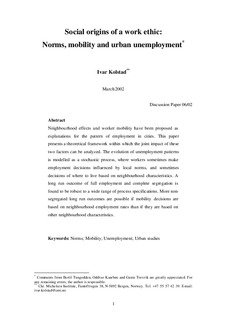| dc.contributor.author | Kolstad, Ivar | |
| dc.date.accessioned | 2006-08-10T10:54:32Z | |
| dc.date.available | 2006-08-10T10:54:32Z | |
| dc.date.issued | 2002-03 | |
| dc.identifier.issn | 0804-6824 | |
| dc.identifier.uri | http://hdl.handle.net/11250/162910 | |
| dc.description.abstract | Neighbourhood effects and worker mobility have been proposed as
explanations for the pattern of employment in cities. This paper
presents a the oretical framework within which the joint impact of these
two factors can be analyzed. The evolution of unemployment patterns
is modelled as a stochastic process, where workers sometimes make
employment decisions influenced by local norms, and sometimes
decisions of where to live based on neighbourhood characteristics. A
long run outcome of full employment and complete segregation is
found to be robust to a wide range of process specifications. More nonsegregated
long run outcomes are possible if mobility decisions are
based on neighbourhood employment rates than if they are based on other neighbourhood characteristics. | en |
| dc.format.extent | 132910 bytes | |
| dc.format.mimetype | application/pdf | |
| dc.language.iso | eng | en |
| dc.publisher | Norwegian School of Economics and Business Administration. Department of Economics | en |
| dc.relation.ispartofseries | Discussion paper | en |
| dc.relation.ispartofseries | 2002:6 | en |
| dc.subject | norms | en |
| dc.subject | mobility | en |
| dc.subject | urban studies | en |
| dc.subject | unemployment | en |
| dc.title | Social origins of a work ethic : norms, mobility and urban unemployment | en |
| dc.type | Working paper | en |
